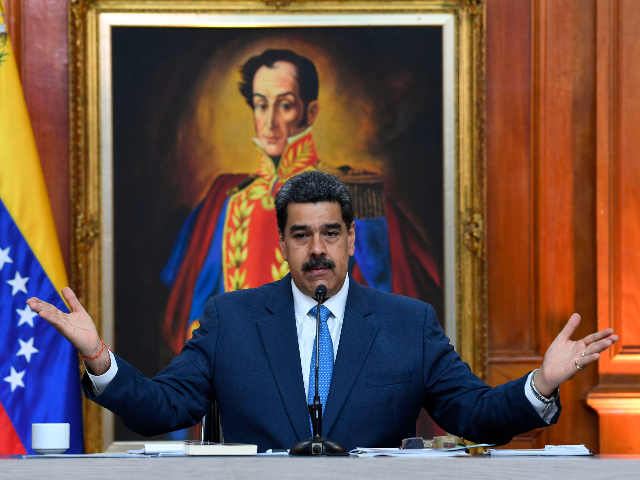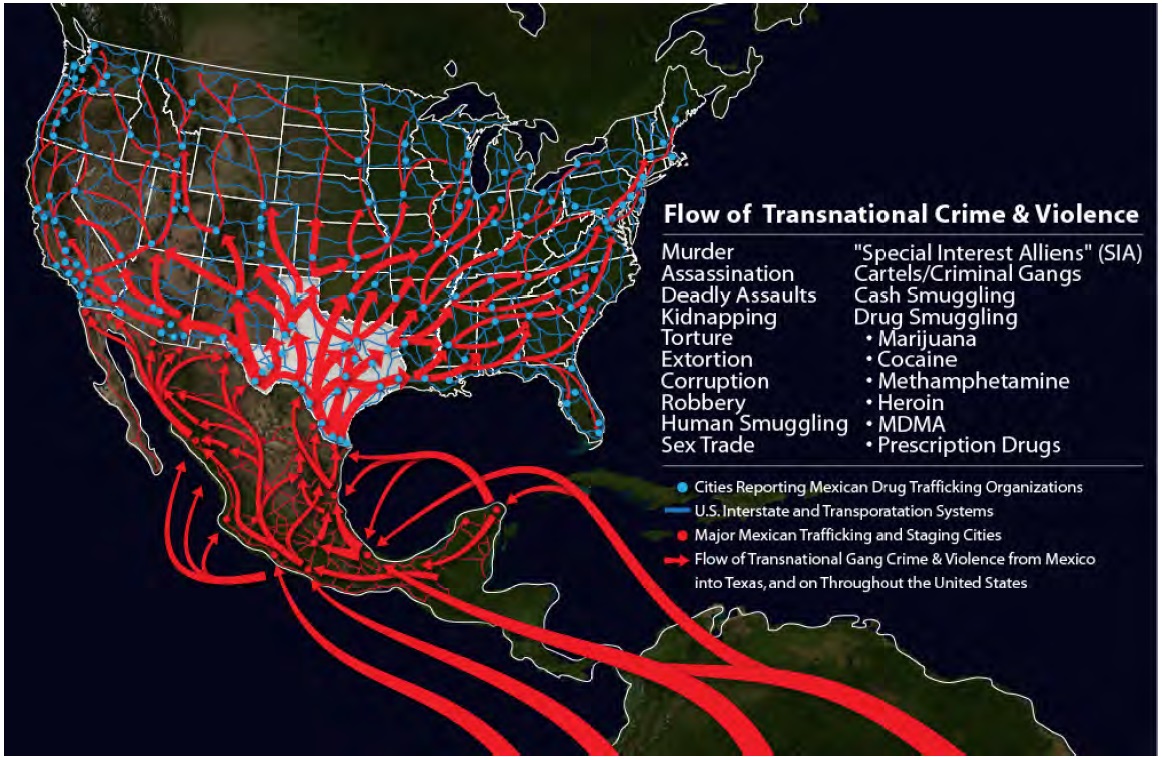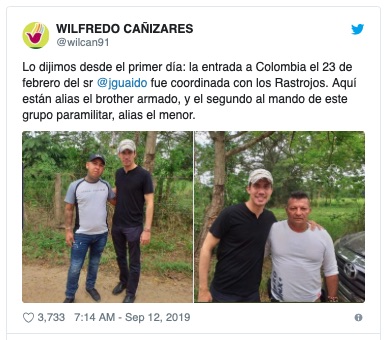
Drop the False Charges Against Maduro
Alliance for Global Justice and CODEPINK and Alliance for Global Justice
The Alliance for Global Justice, CODEPINK, and Friends are inviting organizations and prominent individuals to sign on to the Open Letter below. The letter will be used to educate the press, public, and elected officials about the US government’s economic and political war against Venezuela at a time when all countries are struggling to combat the global pandemic, COVID-19.
For more background, we invite you to read the following excellent analysis.

Trump’s Narcoterrorism Indictment of Maduro Already Backfires
For twenty years, right wing extremists in Miami and Washington have been slandering the Venezuelan government, accusing it of drug trafficking and harboring terrorists without ever offering even a shred of evidence. They finally got their wish on Thursday, when the US Department of Justice unveiled indictments against President Nicolás Maduro and 13 other current or former members of Venezuela’s government and military.
In addition to the indictments, Attorney General William Barr offered a $15 million reward for information leading to the arrest or conviction of Maduro, as well as $10 million rewards for Diosdado Cabello (president of Venezuela’s National Constituent Assembly), Tarek El Aissami (vice president for the economy), Hugo Carvajal (former director of military intelligence) and Cliver Alcalá (retired general).
The indictment has backfired already. Hours after the announcement, Alcalá posted videos online that threaten to cause further splits in the opposition and could result in the arrest of Juan Guaidó. Before going into those details, however, it’s important to understand just how politically biased the charges are against Maduro et al.

Flow of transnational crime & violence
The myth that Venezuela is a narco-state has already been debunked by the Washington Office in Latin America, a think tank in Washington that supports regime change, as well as by FAIR, 15 y Último, Misión Verdad, Venezuelanalysis and others.
It cannot be denied that Venezuela is a transit country for cocaine, but as the maps above and below show, less than 7% of total drug movement from South America transits from Venezuela (the Eastern Caribbean region includes Colombia’s Guajira Peninsula). These maps, produced by the Drug Enforcement Agency and US Southern Command, respectively, immediately raise questions as to why Venezuela is the country being targeted.
Of course, the charges have nothing to do with the drug trade; they are the latest escalation in the Trump administration’s “maximum pressure March.” The pretext is an alleged plot by the Venezuelan government to flood the United States with “somewhere between 200-250 metric tons of cocaine.”
Although that figure might seem high, it’s important to understand the context. The United States is the world’s biggest consumer of cocaine and Colombia is the world’s biggest producer. On the other hand, Venezuela does not cultivate coca, does not produce cocaine and, according to the US government’s own figures, less than 10% of global cocaine traffic transits through the country.

Maritime drug flows from South America in 2017. Photo: Adam Isaacson
For the sake of comparison, the US agencies that provided Barr with the figure of “200-250 tons” also say that an average of nearly 2,400 tons of cocaine flowed through Colombia between 2016 and 2019 (Venezuela averaged 216 tons – ten times less – in the same period).
Colombia’s current president, Iván Duque, is a close ally of the country’s former president, Alvaro Uribe, who himself has been linked to drug trafficking. Almost exactly a year ago, President Trump complained that “more drugs are coming out of Colombia right now than before” Duque was president, yet the US continues giving millions in security aid to Colombia as part of its failed war on drugs.
The US double standard about narco-states is not limited to Colombia. Honduras’s US-backed president, Juan Orlando Hernández, was linked to drug trafficking in a US court, yet this news did not warrant a major announcement by the DOJ, presumably because Hernández is a US ally. Another US ally, Guatemala, had six times as much cocaine flow through its territory as Venezuela.
The indictments are another brick in the foundation for a pretext for either a direct US military invasion or a proxy war using Colombian forces. There are obvious comparisons to 1989, when the US put a $1 million bounty on Panamanian president Manuel Noriega, only to subsequently invade the country, causing an estimated 4,000 deaths. The rewards the US is offering for Maduro and four others are also troubling, as they have already been compared to a bounty.
Maduro has already survived at least one assassination attempt (in August 2018 when drones laden with explosives detonated prematurely), and the rewards could be interpreted as, at minimum, a “get out of jail free” card should someone succeed in murdering him. On the other hand, the rewards verify what the Venezuelan government has been saying all along: the US is offering millions of dollars for people to turn on the country’s leadership.
Yet the Trump administration appears to have made a serious miscalculation by including the retired General Alcalá in the indictments. A former ally of ex-president Hugo Chávez, Alcalá joined the opposition in 2015 and has been linked to various coup plots and planned terror attacks since 2016. He is the highest profile former officer to turn against Maduro and is considered the “leader of pro-Guaidó military personnel.” Alcalá is now wanted both by the United States and by Venezuela.
Alcalá is implicated in a recent plot to attack the Maduro government. On March 24, Colombian authorities seized a truck full of weapons and military equipment, including 26 assault rifles, worth $500,000. Venezuelan intelligence services linked the weapons to three camps in Colombia where paramilitary groups of Venezuelan deserters and US mercenaries are training to carry out attacks against Venezuela. According to Venezuela’s Communication Minister Jorge Rodríguez, these groups were planning to take advantage of the COVID-19 pandemic to attack military units and plant bombs. He also linked the groups to Alcalá.
These allegations proved to be correct, as Alcalá, in a video he posted online hours after the indictments, admitted that the weapons were under his command. He further admitted that the weapons were purchased with funds given to him by Juan Guaidó, with whom he allegedly signed a contract.
Additionally, Alcala claimed that the operation was planned by US advisors, with whom he supposedly met at least seven times. Aclalá also alleged that Leopoldo López, the founder of Guaidó’s party Voluntad Popular who was sprung from house arrest during Guaidó’s April 30 attempted insurrection, had full knowledge of the terror plot.
As a result of these videos, Venezuela’s Attorney General has opened an investigation into Juan Guaidó for an attempted coup. Despite Guaidó’s self-proclamation as president in January 2019, his attempted insurrection in April 2019, his repeated calls for sanctions and a military invasion, Venezuelan authorities had refrained from moving against him. The US indictments appear to have caused the Venezuelan government to issue its strongest response to the Trump administration’s and Guaidó’s continued provocations.
Of course, if the Trump administration were truly serious about combating terror, corruption and drug trafficking, the first Venezuelan they should look at ought to be Juan Guaidó. After all, he was photographed with members of the infamous Los Rastrojos drug cartel, who allegedly helped him cross into Colombia in exchange for his turning a blind eye to the cartel’s expansion from Colombia into western Venezuela.

Guaidó poses with members of Colombian drug cartel at Venezuelan border
Guaidó’s team in Colombia embezzled humanitarian aid funds and now he has been directly implicated in a terror plot, one which presumably used money given to him by the United States (as that is his only source of financing).
The revelations about Guaidó’s spending of US funds to buy weapons and his alleged involvement in yet another violent plot are putting pressure on opposition figures and parties that have hinted at wanting to participate in this year’s legislative elections but have yet to fully commit to dialogue.
A day before the US indictments were revealed, President Maduro invited several of these leaders to join a dialogue in the Apostolic Nuncio (the Vatican’s embassy in Caracas) in order to try to reach consensus over the nation’s response to COVID-19. Now they are faced with the difficult choice of either angering Venezuelan voters (83% of whom reject a military option) by continuing to support Guaidó’s violence or angering the United States by working with indicted government officials.
The Trump administration has been sabotaging a negotiated solution to Venezuela’s problems for two years, including in February 2018, when it threatened an oil embargo and support for a coup during negotiations between the government and the opposition in the Dominican Republic, and again in August 2019, when it imposed a full embargo during another attempt at dialogue.
These new indictments, which even the New York Times described as “highly unusual”, seemed timed to sabotage negotiations once again, as earlier in the week members of the moderate opposition, including National Assembly president Luis Parra, had recently urged the US to lift the sanctions due to the coronavirus pandemic.
Yet another blunder with the indictments is that the Trump administration is sending contradictory messages. On the one hand, they have spent three years urging high level Venezuelan government and military officials to defect, promising space to operate politically after a transition government comes into power. On the other, they indicted the most high-profile member of the military who has defected, Cliver Alcalá, on serious charges of narcoterrorism.
The brazenness of the indictments in attempting to cast Venezuela as a narco-state, the lack of foresight regarding possible repercussions, the attempted sabotage of dialogue and the mixed messaging are all signals that the Trump administration is desperate to ensure its regime change policy shows results. The victims of this policy are the Venezuelan people, who would be much better off with a policy of de-escalation, dialogue and a removal of the deadly sanctions.
Leonardo Flores is Latin American policy expert and campaigner with CODEPINK.

ACTION ALERT: Open Letter to Condemn Trump Administration’s Hypocritical Indictment on Drug Charges of Venezuelan President Nicolas Maduro and High-Ranking Venezuelan Officials
We, the undersigned organizations and prominent individuals, condemn the false claims of criminal charges by the US government against the President of the Bolivarian Republic of Venezuela and other high-ranking officials with the pretext of their alleged involvement in international drug trafficking.
The US government is offering a $15 million bounty for information that would lead to the arrest of Venezuelan President Maduro. Bounties of $10 million are offered for the National Constituent Assembly President Diosdado Cabello, retired generals Hugo Carvajal and Clive Alcala, Minister for Industry and National Production Tareck El Aissami, and other Venezuelans. The US government indictments accuse the Venezuelan officials of participating in a “narco-terrorism conspiracy” with the Colombian guerrilla group FARC to “flood the United States with cocaine.”
The US has refused to recognize the democratically elected Venezuelan President Maduro and has been seeking to install one to its liking, currently Juan Guaido. What the US is doing is ordering the arrest of world leaders it does not approve of, putting a bounty on their heads.
This decision of the US constitutes a further escalation in coercive measures against a sovereign country, which has included sanctions so extreme as to create a blockade, costing Venezuela 40,000 lives in a period of just over a year and $116 billion in lost revenue.
It is well-documented that two close and long-time US allies in Latin America, the governments of Colombia and Honduras, have been heavily involved in narco-trafficking. The last Latin American leader the US charged with drug trafficking was Panama’s Manuel Noriega (who was running drugs with the CIA). The US then invaded his country and later imprisoned him in Miami.
Actual Evidence of Venezuela Involvement in Drug Trafficking
The Washington Office on Latin America (WOLA), which is unfriendly to the Venezuelan government, finds: “CCDB [US interagency Consolidated Counterdrug Database] data does not justify many of the claims made by those who advance the ‘narcostate’ narrative to describe organized crime in Venezuela today and to argue against efforts to achieve a negotiated path to democratic governance in Venezuela. As noted, US authorities estimate that 93 percent of US-bound cocaine is trafficked through Western Caribbean and Eastern Pacific routes, not through Venezuela’s Eastern Caribbean coast.”
The WOLA study found that the US government data suggests that, despite these challenges, Venezuela is not a primary transit country for US-bound cocaine. The State Department reports that over six times as much cocaine passed through Guatemala in 2018 than through Venezuela. Around 90 percent of all US-bound cocaine is trafficked through western Caribbean and eastern Pacific routes, not through Venezuela’s eastern Caribbean seas.
The US Department of Justice has not presented evidence to substantiate their narco-trafficking indictment. Washington’s case looks politically motivated. In the wake of over six years of US sanctions and over a year of failed attempted coups, the majority support of the Venezuelan people for their democratically elected government has not been shaken.
We the undersigned demand that the US government:
- Drop the groundless indictments against President Maduro and others.
- Lift the sanctions so that Venezuela can purchase life-giving medicines and medical equipment to fight the coronavirus pandemic that is threatening the entire world.
- Restore normal relations with Venezuela based on peace and respect for national sovereignty.
Sincerely, Chuck Kaufman, National Co-Coordinator, Alliance for Global Justice and Terri Mattson, Latin America Coordinator, CODEPINK.
Note: If you are authorized to sign on behalf of your organization, click here or send an email to: AfGJ@AFGJ.org with name, title, organization name, address and contact email. This letter will be open for sign-ons until April 12, 2020.

End the Illegal Sanctions against Nicaragua
In 2018 the US Congress imposed sanctions on Nicaragua, blocking development loans from international financial institutions even though the IMF, World Bank, and Inter-American Development Bank were praising Nicaragua’s use of funds and the effectiveness of its programs.
The loans that Nicaragua was receiving were improving conditions for ordinary Nicaraguans through poverty reduction, education, health care, infrastructure development, and economic growth during an 11-year period in which GDP grew almost 5% annually. This prosperity was widely shared in the country that has Latin America’s second-most egalitarian economy (World Bank, 2017).
The impact is compounded by additional Trump administration sanctions against Nicaraguan banks, companies, and individuals in an effort to isolate Nicaragua’s economy from the international community. It is part of a US strategy of using its dominance of the international financial system to isolate governments it doesn’t like, thereby punishing one-third of the world’s population. In Nicaragua the initial effect is to discourage direct foreign investment and stifle businesses that use imported components and software.
The sanctions are to remain in place until the US State Department unilaterally determines that the country meets its definition a democratic government.
The United Nations has declared that such “unilateral coercive measures” are illegal because they punish an entire population for disagreements between governments. Sanctions have been proven to cause suffering and death around the world and are a form of warfare.
Finally, the US State Department’s website is wielded as a weapon to discourage travel to Nicaragua and further damage the economy by hitting the tourism industry. Claims that the country is unsafe, particularly for Americans, are not only false and detrimental to Nicaraguans, they also maliciously deceive Americans to deprive them of their right to visit the country and judge it for themselves.
Please send a message to your US Congress Member to end the immoral sanctions against Nicaragua!
Posted in accordance with Title 17, Section 107, US Code, for noncommercial, educational purposes.